Electric vehicle (EV) range anxiety is rapidly diminishing as a concern for drivers. The latest advancements in electric car technology mean that many models can now confidently travel impressive distances on a single charge. Official tests using the Worldwide Harmonised Light Vehicle Test Procedure (WLTP) standard confirm that numerous EVs now boast ranges exceeding 400 miles, making long journeys a practical reality.
This article highlights 12 exceptional electric cars that each offer an official range of at least 390 miles. Many of these vehicles surpass the 400-mile mark, with some even achieving over 450 miles between charges. Imagine driving from London to Edinburgh without needing to stop for a recharge! And even if a charging stop is necessary, the rapid charging capabilities of many of these EVs mean you can regain up to 80% battery capacity in under 20 minutes at compatible charging stations.
The impressive range isn’t limited to ultra-premium, high-priced EVs. Within this selection of 400+ mile range electric cars, you’ll find models from Peugeot, Volkswagen, Tesla, and Polestar. Several of these long-range champions are available for under £50,000, and some even dip below £45,000, demonstrating that extended range is becoming increasingly accessible.
Before planning an extensive road trip in your new EV, it’s important to remember that real-world range can sometimes differ from manufacturer claims and even the WLTP figures. Factors like driving style, speed, weather conditions, and terrain can influence actual range. However, even with these variables considered, consistently achieving 250 to 300 miles on a single charge is now a realistic expectation for many modern electric cars, even when maintaining motorway speeds of around 70 mph.
Instead of ranking these EVs in a subjective order, we’ve listed them according to their official range, starting with the longest. This approach allows you to immediately identify the EVs that offer the greatest range and then evaluate which model best suits your needs based on factors like price, size, comfort, and performance, in addition to range.
How Electric Car Range is Tested
The range figures quoted in this article are primarily based on the WLTP standard, a globally harmonized testing procedure used to determine the range and efficiency of electric vehicles. While WLTP provides a standardized benchmark for comparison, it’s crucial to understand how these figures are obtained.
Expert motoring critics conduct thorough real-world testing of each car featured. These evaluations involve extended test drives across diverse road types, from urban environments to rural roads and motorways. By borrowing vehicles for several days, reviewers can comprehensively assess manufacturer range claims under varied conditions. They meticulously monitor how factors like driving style, road conditions, and ambient temperature affect an EV’s range and energy efficiency.
It’s important to note that while a long range is a significant advantage, our overall expert scoring considers a wide range of factors beyond just range. Our ratings encompass value for money, build quality, driving dynamics, practicality, performance, and technological features. Therefore, while these EVs are champions of range, our scores reflect a holistic assessment of each vehicle.
Top Electric Cars with the Longest Range in 2025
Here are some of the leading electric cars in 2025 that excel in providing extended driving range, helping to alleviate range anxiety and making electric vehicle ownership more practical for long journeys.
Mercedes-Benz EQS 450+: Starting from £112,610, Mercedes-benz.co.uk
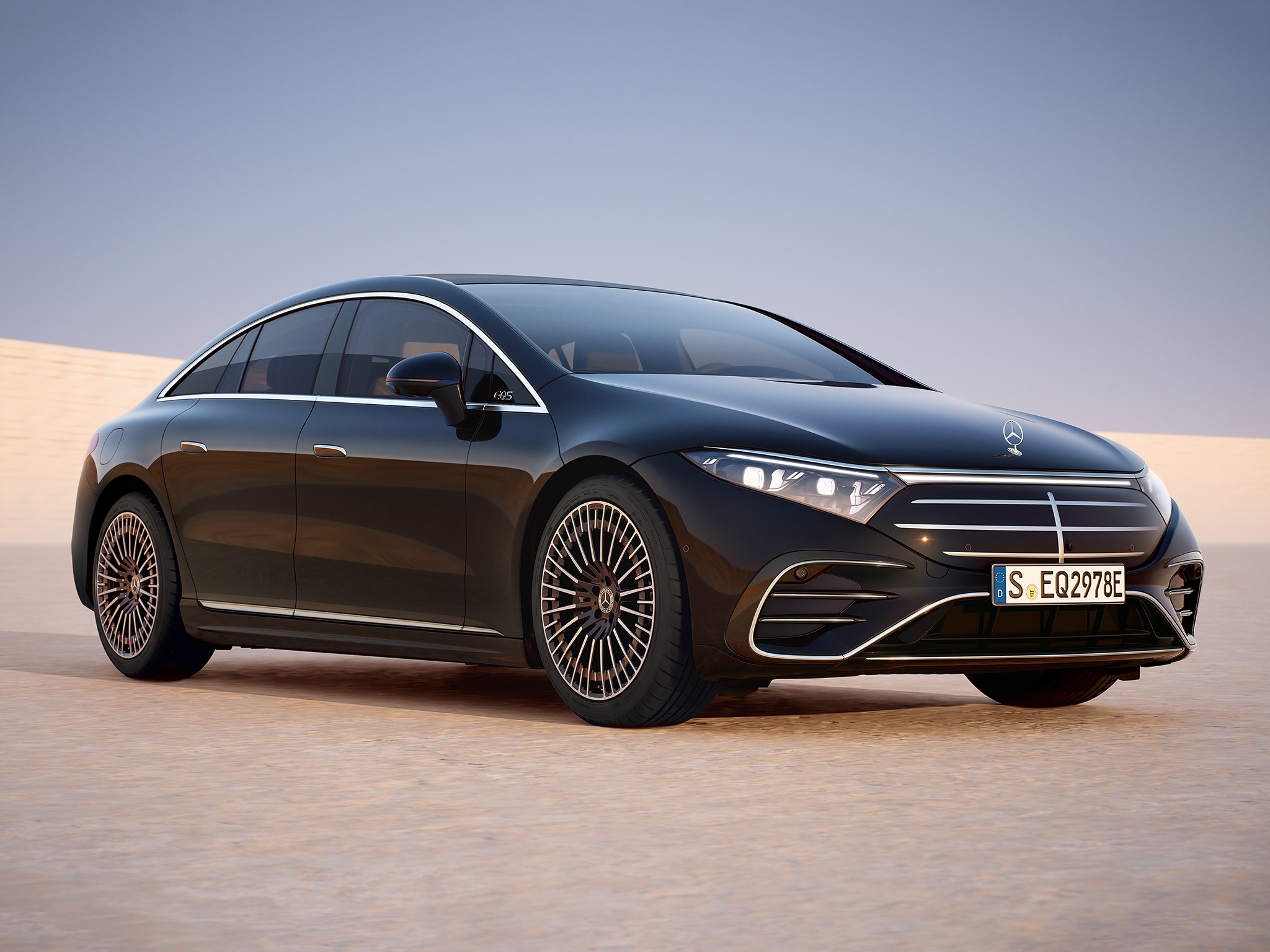 Mercedes-Benz EQS
Mercedes-Benz EQS
Image: The Mercedes-Benz EQS, a luxury electric sedan with a class-leading long range.
Independent Expert Rating: 6/10
Pros: Exceptional long range, luxurious interior, advanced technology integration.
Cons: Premium price point, luxury experience not fully aligned with traditional S-Class standards.
Price Range: £99,835 to £161,860
Battery Options: 90.6kWh or 107.8kWh
Maximum Official Range: 481 miles
Efficiency (Claimed): 3.6 miles per kWh
Peak Charging Rate: 200kW
The Mercedes EQS currently holds the title for the longest-range EV, boasting an impressive official range of 481 miles. This range theoretically allows for a non-stop drive from London to Edinburgh, a journey of approximately eight hours, with sufficient charge remaining to locate a charging point upon arrival. However, as with all EVs, real-world range is influenced by speed, driving habits, temperature, and battery condition.
This exceptional range is achieved through the EQS’s substantial 107.8 kWh battery. A 200 kW maximum charging rate allows for a 10-80% charge in around one hour. While not the fastest charging time available, it offers a reasonable break during extended journeys.
Read our comprehensive Mercedes EQS review
Despite its range leadership, the EQS has certain limitations. While technologically advanced, it doesn’t fully replicate the luxury benchmark set by the Mercedes S-Class, particularly in terms of overall refinement, rear passenger comfort, and noise isolation. The BMW i7 is arguably a more compelling electric luxury sedan, although it doesn’t quite match the EQS in range.
Polestar 3 Long Range Single Motor: Starting from £69,900, Polestar.com
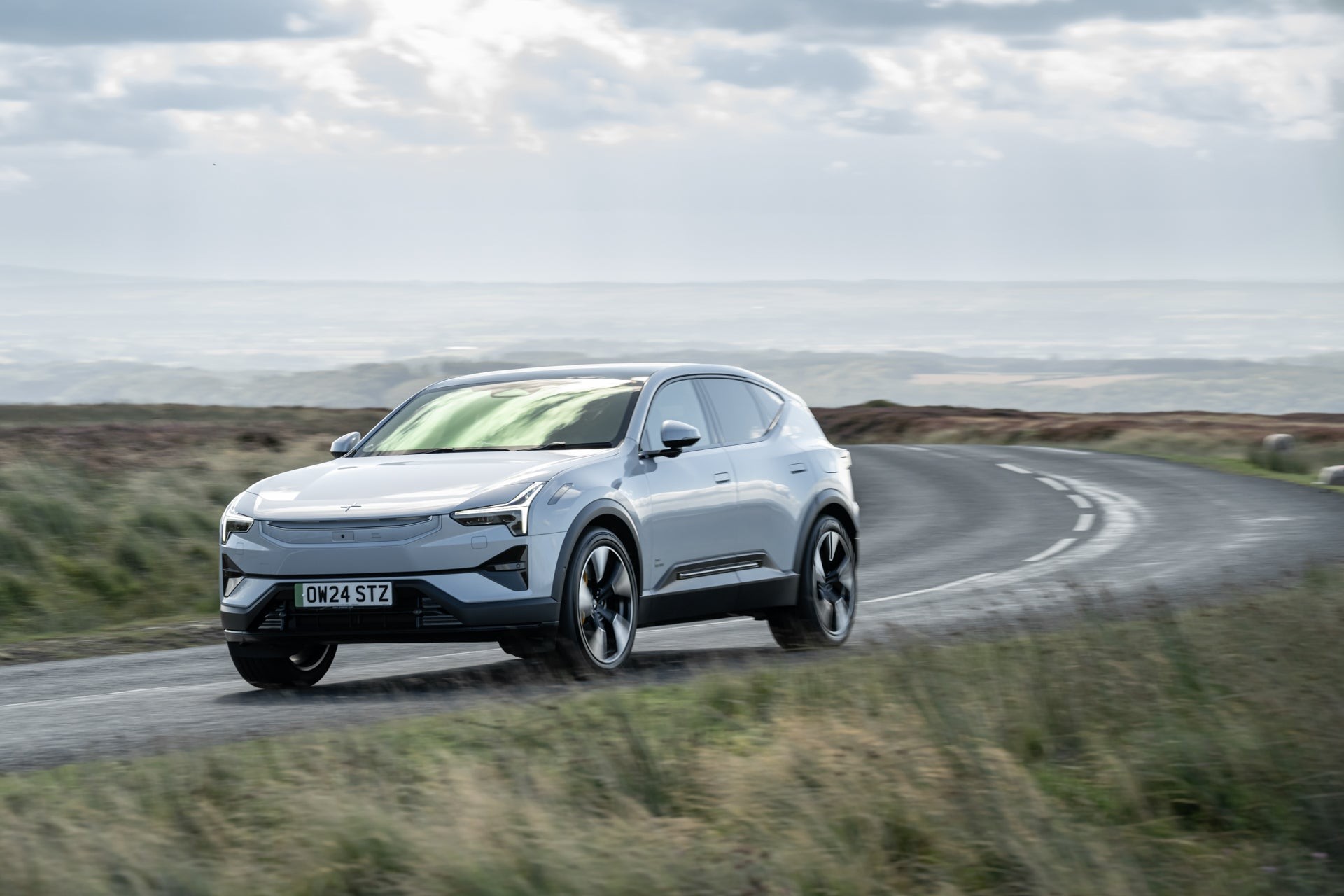
Image: The Polestar 3, a stylish and spacious electric SUV offering excellent long-range capability.
(Polestar)
Independent Expert Rating: 8/10
Pros: Engaging driving experience, comfortable ride quality, spacious cabin, extensive standard equipment.
Cons: Minimalist interior with limited physical controls, no seven-seat configuration option.
Price Range: £69,900 to £81,900
Battery Capacity: 111 kWh
Maximum Official Range: 438 miles
Efficiency (Claimed): 3.3 miles per kWh
Peak Charging Rate: 250 kW
The single-motor version of the Polestar 3 achieves an official range of 438 miles, securing it the second-longest range among EVs currently available in the UK. It shares the same large 111 kWh battery as the dual-motor variants but utilizes a less powerful motor (still providing a respectable 295 bhp and a 0-62 mph acceleration time of 7.8 seconds).
Explore our in-depth Polestar 3 review
All Polestar 3 models boast a rapid 250 kW maximum charging rate. When connected to a compatible high-power charger, they can replenish the battery from 10% to 80% in just 30 minutes, or achieve a full charge from empty in approximately 11 hours using a home charger.
The Polestar 3’s minimalist interior centers around a 14.5-inch touchscreen powered by Google’s Android Automotive system. This provides seamless integration with Google Maps, Google Assistant, and Spotify. The sound system is also noteworthy, featuring Dolby Atmos surround sound compatibility for an immersive audio experience.
Volkswagen ID.7 Pro S Match: Starting from £55,480, Volkswagen.co.uk
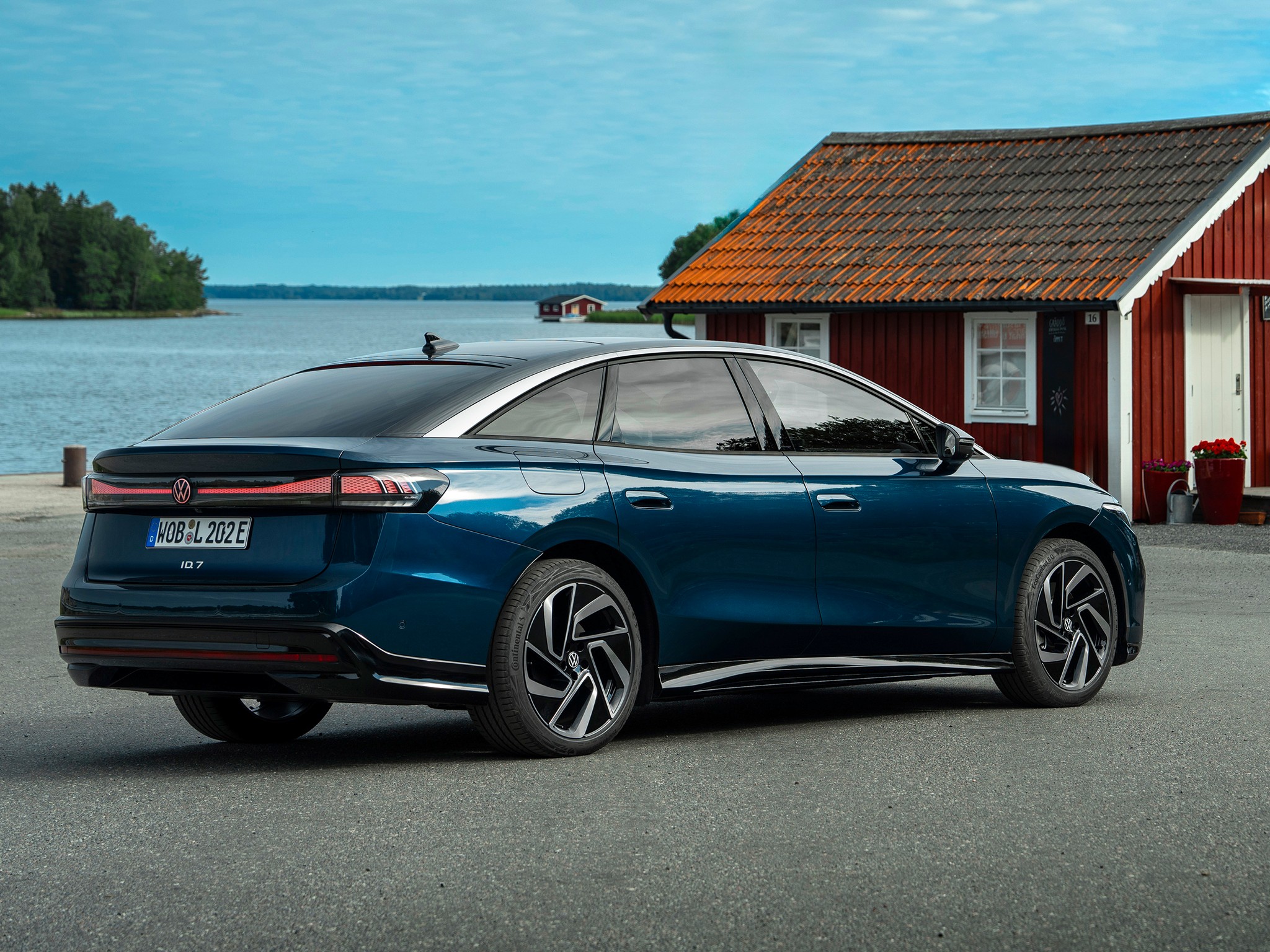 Volkswagen ID.7
Volkswagen ID.7
Image: The Volkswagen ID.7, a comfortable and spacious electric sedan with a very long driving range.
(Volkswagen)
Independent Expert Rating: 8/10
Pros: Excellent long range, smooth and comfortable ride, generous interior space.
Cons: Uninspiring exterior styling, infotainment system usability could be improved.
Price Range: £51,550 to £61,980
Battery Options: 77kWh to 86kWh
Maximum Official Range: 436 miles
Efficiency (Claimed): 4.54 miles per kWh
Peak Charging Rate: 175kW
While not leading the pack in outright range, the Volkswagen ID.7’s official range of 436 miles is highly impressive and earns it a strong second place. Critically, it receives a higher expert rating (8/10) compared to the longer-range Mercedes EQS (6/10), highlighting its overall strengths.
We consider the ID.7 to be Volkswagen’s current top-performing EV. While positioned in a different price category than the Tesla Model 3, the ID.7 offers a level of comfort and refinement that approaches Mercedes-Benz standards.
See our detailed Volkswagen ID.7 review
The ID.7 signals Volkswagen’s progress in the EV market. Despite a somewhat conservative exterior design, its strengths are substantial. Beyond its range, the ID.7 excels in passenger comfort, offering abundant rear legroom and a remarkably smooth, limousine-like ride quality, arguably surpassing some Mercedes-Benz models in this aspect.
Technology features are well-integrated, although the infotainment touchscreen usability remains an area for improvement in VW’s EVs.
Tesla Model 3 Long Range Rear-Wheel Drive: Starting from £44,990, Tesla.com
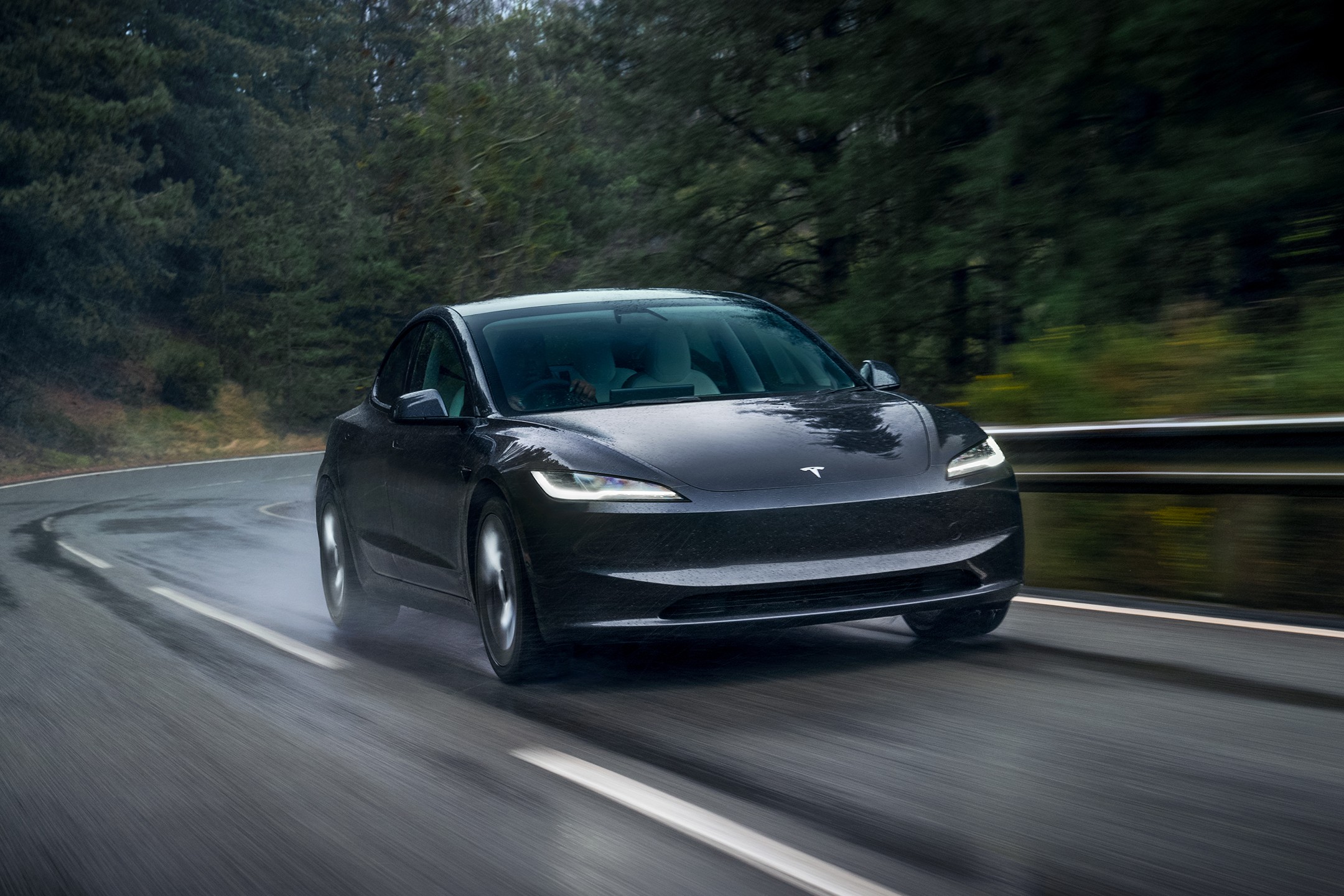 Tesla Model 3
Tesla Model 3
Image: The Tesla Model 3, a highly-rated electric car now available in a long-range rear-wheel-drive configuration.
(Tesla)
Independent Expert Rating: 10/10
Pros: Cutting-edge technology, engaging driving dynamics, high energy efficiency, access to Tesla Supercharger Network.
Cons: No Apple CarPlay integration.
Price Range: £44,990
Usable Battery Capacity: 60 – 75 kWh
Maximum Official Range: 436 miles
Efficiency (Claimed): 4.7 miles per kWh
Peak Charging Rate: 170 kW
The Tesla Model 3 is widely considered to be one of the best electric cars currently available. The introduction of the Long Range Rear-Wheel Drive variant in October 2024 further enhances its appeal by offering exceptional range.
This new Model 3 version combines the larger battery pack with a single-motor rear-wheel-drive system. This configuration allows Tesla to deliver a Model 3 with an official range of 436 miles, matching the Volkswagen ID.7 for second place in our long-range ranking.
Explore our full Tesla Model 3 review
The Model 3 also benefits from a fast 170 kW charging capability and access to Tesla’s Supercharger network. The Supercharger network provides reliable and often cost-effective fast charging. Coupled with its advanced technology, efficiency, and spacious five-seat interior, the Model 3 presents a compelling overall package.
Minor drawbacks include the replacement of traditional stalks with steering wheel buttons for indicators and wipers, which some drivers may find less intuitive. However, once accustomed to these controls, the Model 3 is a superb electric car, now enhanced with impressive long-range capability.
Mercedes-Benz EQE 350+: Starting from £69,105, Mercedes-benz.co.uk
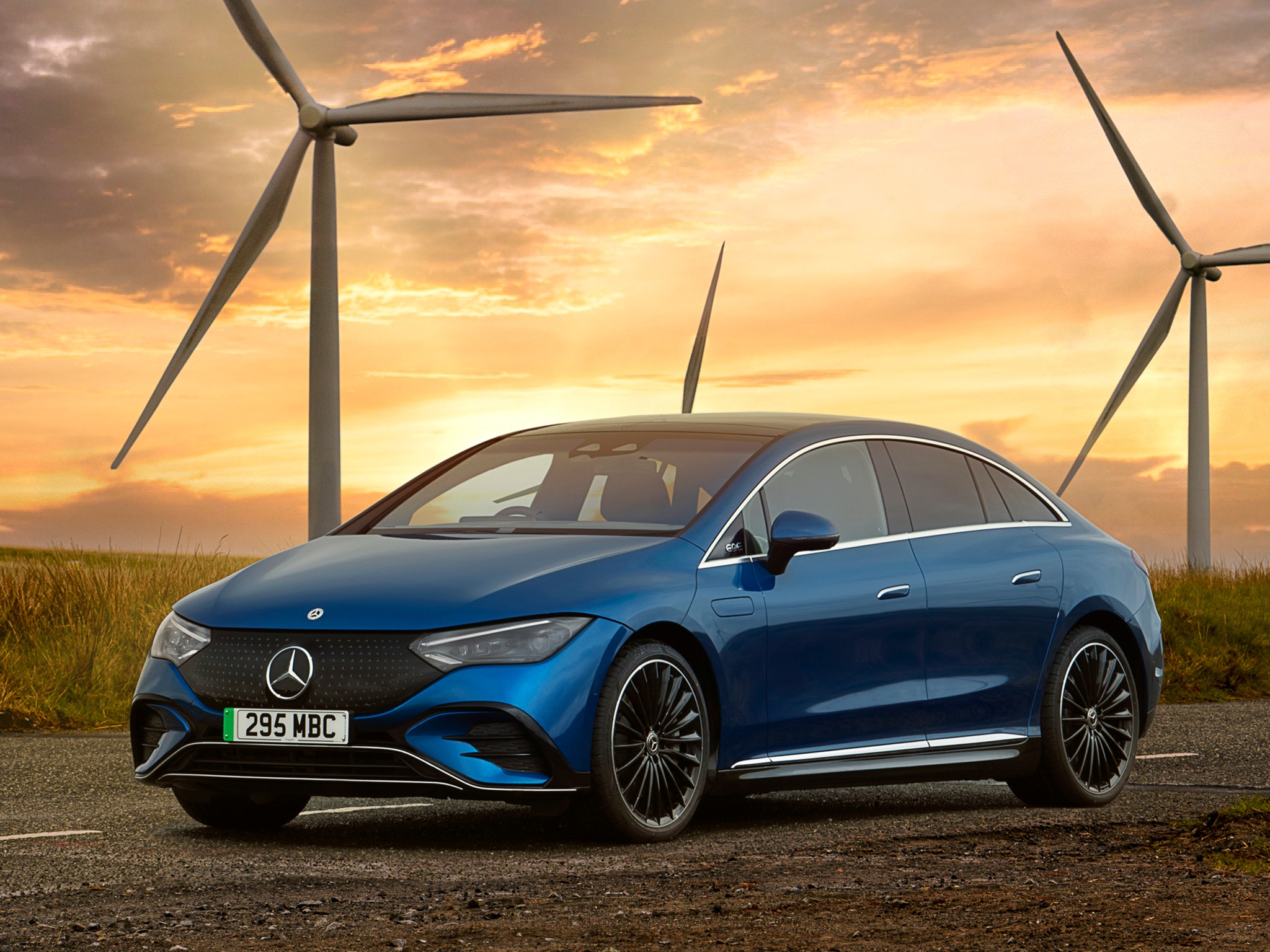 Mercedes EQE
Mercedes EQE
Image: The Mercedes-Benz EQE, a stylish and comfortable electric sedan offering over 400 miles of range.
(Mercedes-Benz)
Independent Expert Rating: 8/10
Pros: Superb long range, excellent comfort for long journeys, high-tech interior.
Cons: Polarizing futuristic styling, practicality limitations, potential for rapid price increase with options.
Price Range: £69,105 to £115,860
Battery Capacity: 90 kWh
Maximum Official Range: 429 miles
Efficiency (Claimed): 3.8 miles per kWh
Peak Charging Rate: 170 kW
The Mercedes EQE is a sleek, modern electric sedan with a long range exceeding 400 miles and strong energy efficiency. It surpasses many key competitors in range, complemented by exceptional long-distance comfort and a futuristic, high-tech interior.
Extensive testing, including long motorway journeys, has validated the real-world range of the EQE’s large 96kWh battery. The infotainment system is notably advanced, featuring sophisticated connectivity and personalized “self-learning” functions. The optional Burmester sound system also delivers impressive audio quality.
View our comprehensive Mercedes EQE review
However, the EQE’s price can escalate quickly with added options. The sloping roofline compromises rear headroom and boot space, and some interior material quality aspects are not fully premium. Overall, the EQE remains a compelling electric executive sedan with a remarkable range and abundant technology.
Peugeot e-3008: Starting from £45,950, Peugeot.co.uk
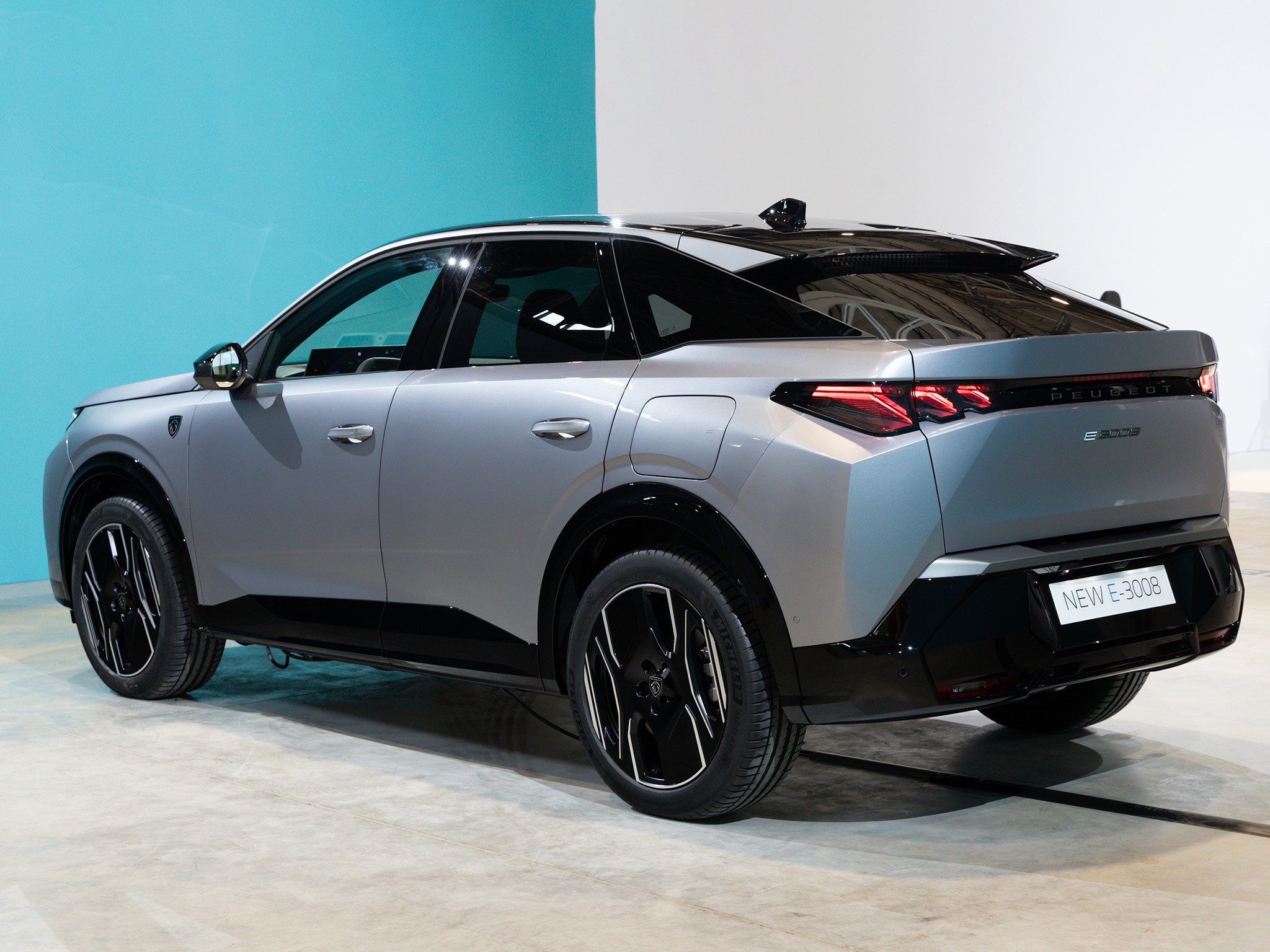 Peugeot e-3008
Peugeot e-3008
Image: The Peugeot e-3008, a stylish and well-regarded electric SUV with a long-range option.
(Peugeot)
Independent Expert Rating: 8/10
Pros: Striking design, elegant interior, excellent range for its class.
Cons: Rear seat space could be more generous, heat pump is an optional extra.
Price Range: £45,950 to £52,350
Battery Options: 73kWh, 98kWh
Maximum Official Range: 327 to 422 miles
Efficiency (Claimed): 3.1 miles per kWh
Peak Charging Rate: 170 kW
Peugeot demonstrates that long-range EVs are not exclusive to premium German brands. The e-3008 starts at around £45,000 and offers a range of up to 422 miles when equipped with the larger 98 kWh battery, expected in early 2025. Even the standard 73 kWh battery version, with a 327-mile range, is impressive for its price point.
Combined with a 170 kW fast charging capability, the e-3008 is a popular choice among reviewers. Its stylish exterior is matched by a distinctive and high-quality interior, packed with technology.
Read our detailed Peugeot e-3008 review
The e-3008 can charge from 20% to 80% in as little as 30 minutes at high-speed public chargers. It also delivers a comfortable and secure driving experience with numerous driver assistance systems.
A minor criticism is that the heat pump, beneficial for energy efficiency in cold weather, is an optional extra rather than standard equipment. Slightly more rear seat space would also be welcomed.
Porsche Taycan: Starting from £86,500, Porsche.com
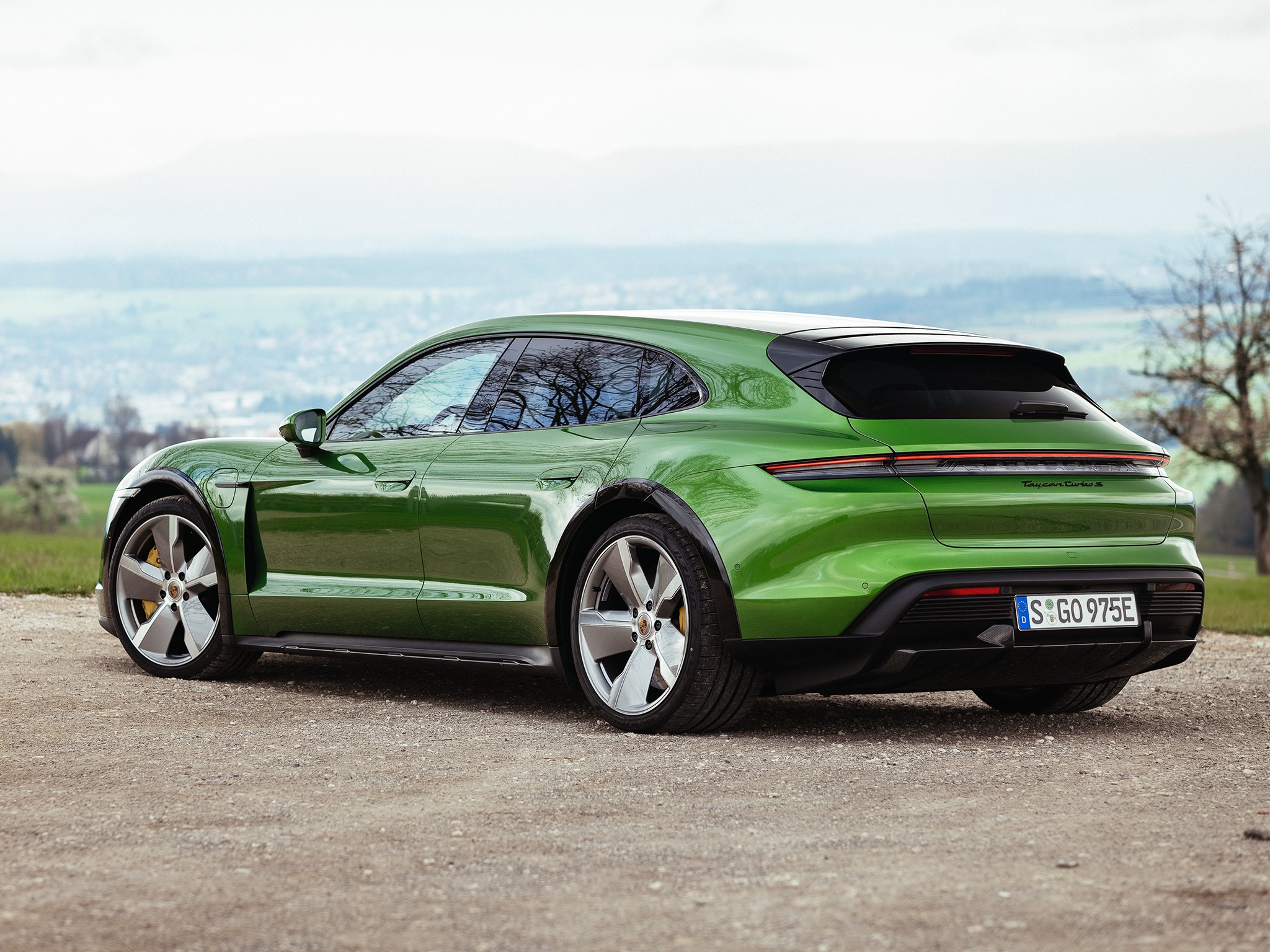 Porsche Taycan Cross Turismo
Porsche Taycan Cross Turismo
Image: The Porsche Taycan Cross Turismo, showcasing the Taycan range’s sporty design and long-range capability.
(Porsche)
Independent Expert Rating: 9/10
Pros: Exceptionally fast charging speeds, good range, exhilarating performance in Turbo S trim.
Cons: Expensive optional extras, limited rear passenger space, potential depreciation.
Price Range: £86,500 to £186,300
Battery Options: 89kWh to 105 kWh
Maximum Official Range: 360 to 421 miles
Efficiency (Claimed): Up to 3.72 miles per kWh
Peak Charging Rate: 320 kW
Porsche’s pioneering electric car, the Taycan, originally launched in 2019. A 2024 update has significantly enhanced its range, power, and charging speed, making it competitive again in the long-range EV segment.
The longest-range Taycan configuration now offers an official range of approximately 421 miles. It also leads in charging speed with a maximum rate of 320kW. Using a high-power charger, the Taycan can replenish its large 105kWh battery from 10% to 80% in just 18 minutes.
Explore our detailed Porsche Taycan review
The Taycan retains Porsche’s signature design and driving dynamics despite being an EV. Its unique two-speed gearbox provides a more engaging driving experience compared to single-speed EV transmissions. The updated model features Porsche Active Ride suspension, which enhances cornering stability and ride comfort through advanced body control.
For ultimate performance, the Taycan Turbo GT variant prioritizes acceleration, achieving 0-62 mph in just 2.2 seconds, although with a slightly reduced range closer to 350 miles.
Peugeot e-5008: Starting from £48,495, Peugeot.co.uk
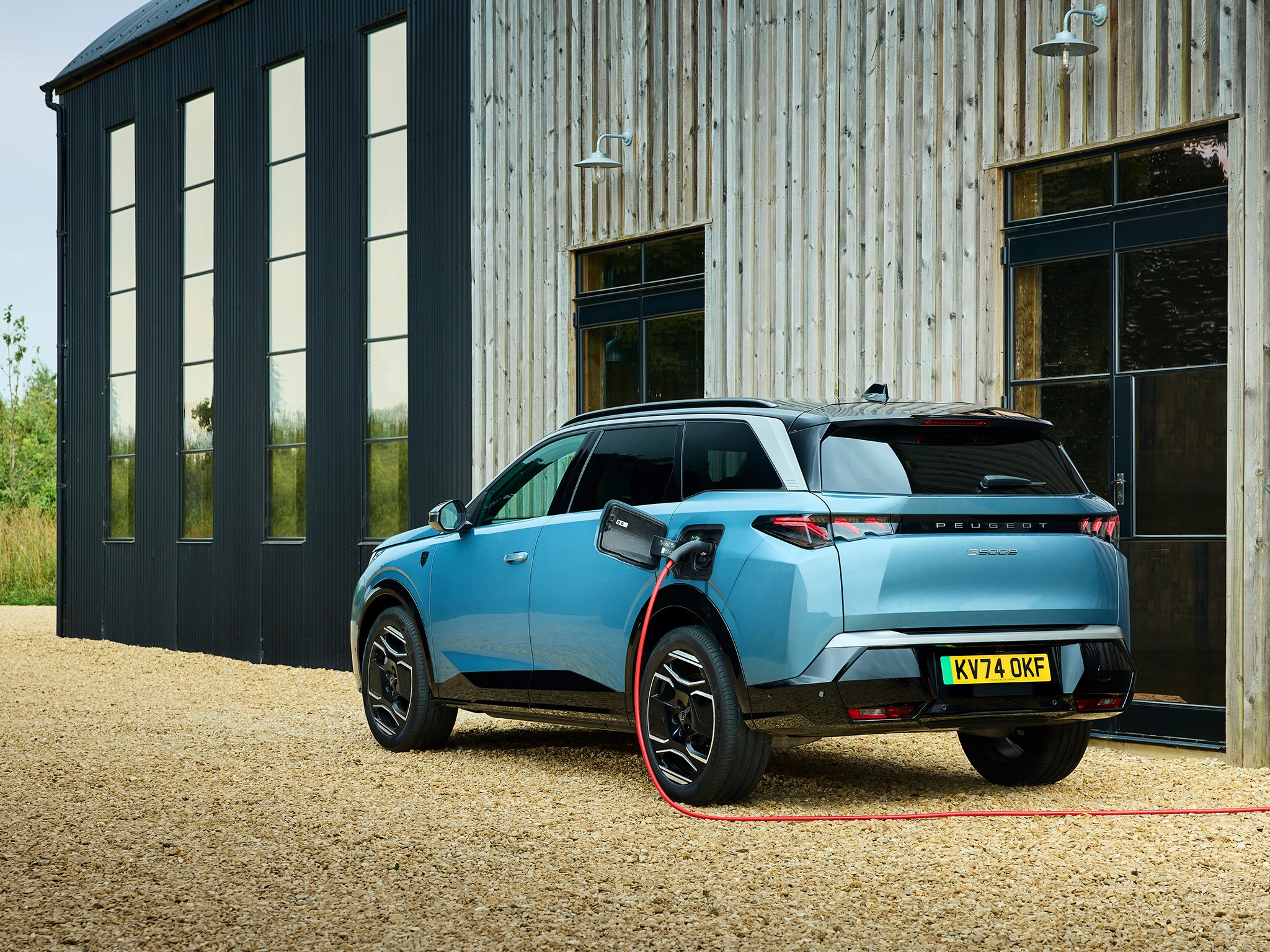 Peugeot e-5008
Peugeot e-5008
Image: The Peugeot e-5008, a seven-seat electric SUV with a long driving range, ideal for families.
(Peugeot)
Independent Expert Rating: 8/10
Pros: Seven-seat capacity, excellent range, generous standard equipment levels.
Cons: Less engaging driving experience, larger battery version arriving later, pricier than hybrid models.
Price Range: £48,495 to £52,295
Battery Options: 73kWh (96kWH coming later)
Maximum Official Range: 410 miles
Efficiency (Claimed): 3.9 miles per kWh
Peak Charging Rate: 160kW
Peugeot again features in this long-range EV list, this time with the e-5008, a seven-seat electric SUV. Its combination of range and passenger capacity is relatively unique in the EV market. The e-5008 impresses with its stylish design and premium-feeling interior that provides spaciousness across all three rows without feeling overly large to drive.
Currently, the e-5008 is available with a 73kWh battery offering around 310 miles of range. A larger 96kWh battery option, promising over 400 miles of range, will be available soon, albeit at a higher price point around £52,000.
View our comprehensive Peugeot e-5008 review
The e-5008 offers a respectable 160kW maximum charging rate and comes well-equipped as standard. It is user-friendly and practical, making it well-suited for families needing seven seats.
While pricier than Peugeot’s hybrid 5008 models, the e-5008 is a strong contender for buyers seeking a long-range, seven-seat electric vehicle.
Polestar 2: Starting from £44,950, Polestar.com
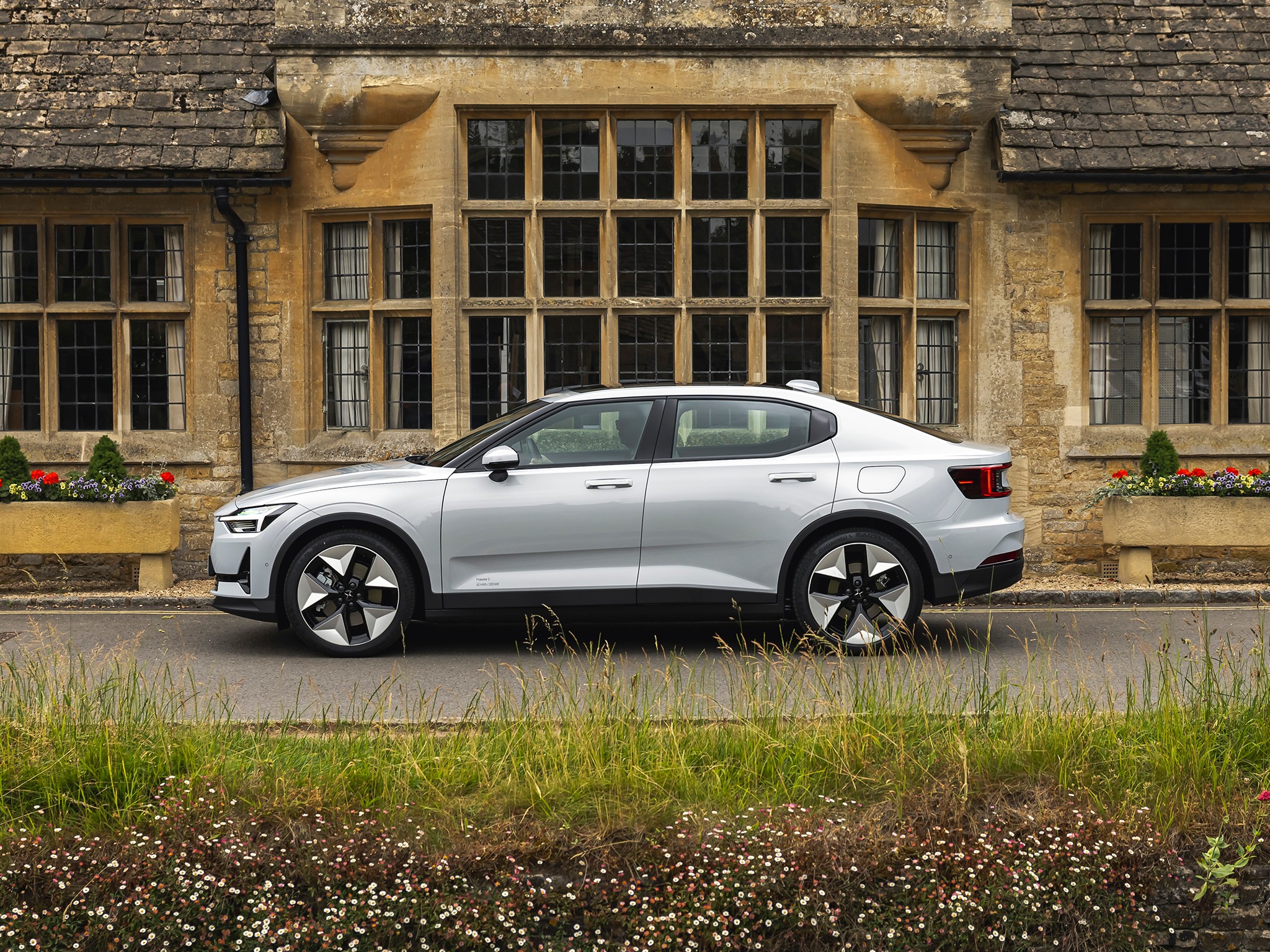 Polestar 2
Polestar 2
Image: The Polestar 2, a stylish and efficient electric fastback with a long driving range.
(Polestar)
Independent Expert Rating: 7/10
Pros: Good range and efficiency, intuitive Android-based infotainment, occasional manufacturer discounts.
Cons: Firm ride quality, can become expensive with options, limited rear headroom.
Price Range: £44,950 to £57,950
Battery Options: 69 to 82kWh
Maximum Official Range: 408 miles
Efficiency (Claimed): 4.2 miles per kWh
Peak Charging Rate: 205 kW
Similar to the Porsche Taycan, the Polestar 2 received a mid-life update that significantly increased its range. The updated Polestar 2, with the larger 82kWh battery, now offers an official range of 406 miles and a 205kW maximum charging rate.
While not class-leading in charging speed, it is still competitive, allowing for a 10-80% charge in approximately 28 minutes.
Read our detailed Polestar 2 review
Beyond range, the Polestar 2 is praised for its stylish design, engaging driving experience, and user-friendly infotainment system. It utilizes Android Automotive, providing native Google Maps integration (including EV routing and charge point awareness), Google Assistant, Play Store access, and Spotify. Apple CarPlay is also supported, and the overall user interface is among the best in the EV segment.
Mercedes-Benz EQS SUV: Starting from £129,470, Mercedes-benz.co.uk
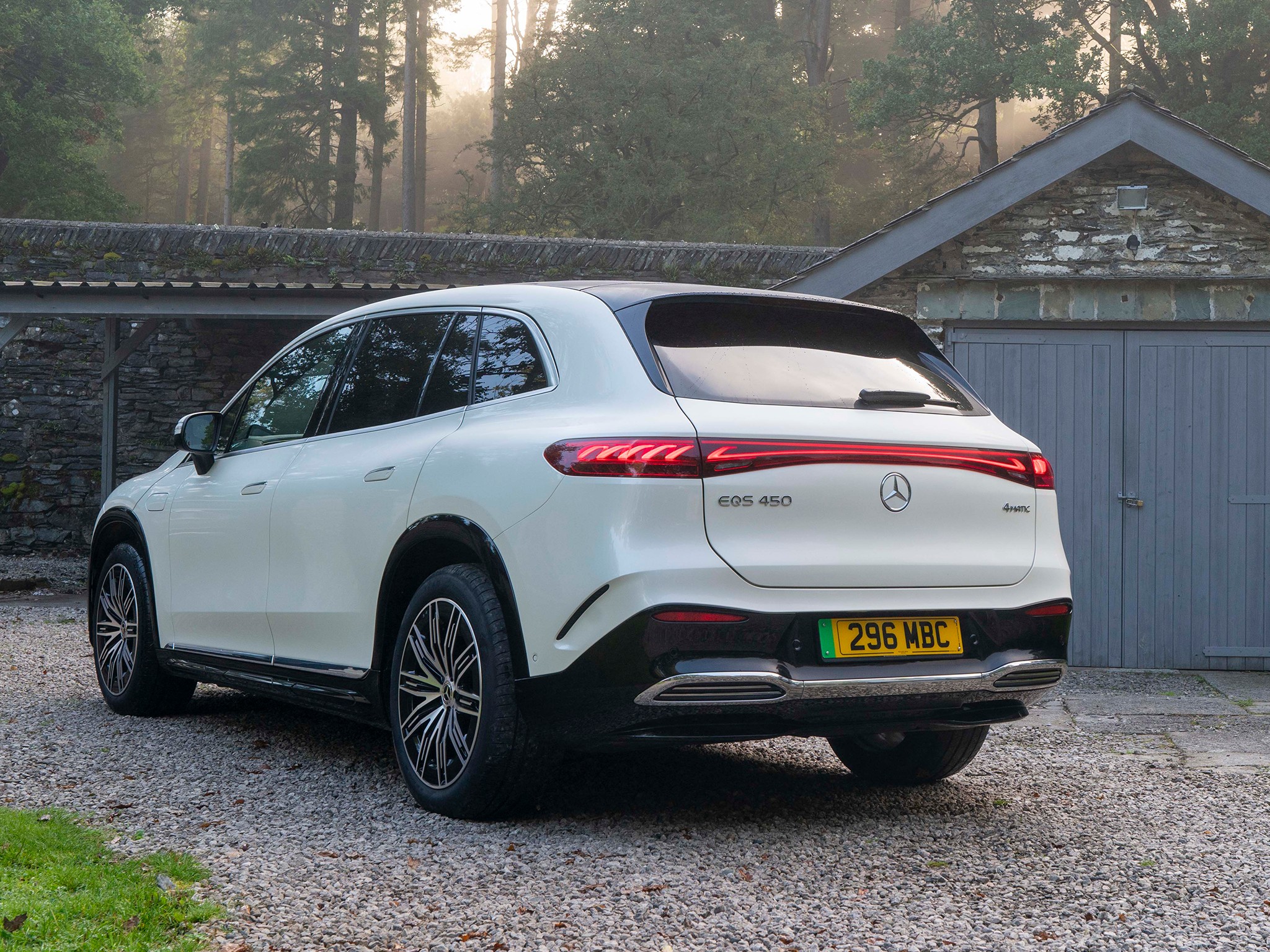 Mercedes-Benz EQS SUV
Mercedes-Benz EQS SUV
Image: The Mercedes-Benz EQS SUV, an ultra-luxury electric SUV with a long range and spacious interior.
(Mercedes-Benz)
Independent Expert Rating: 6/10
Pros: Ultra-luxurious interior, excellent long range, exceptional refinement.
Cons: High price, soft suspension tuning, substantial size for UK roads.
Price Range: £129,470 to £144,000
Battery Capacity: 118kWh
Maximum Official Range: 404 miles
Efficiency (Claimed): 3.0 miles per kWh
Peak Charging Rate: 200kW
The Mercedes EQS SUV is an ultra-luxury electric SUV that combines a fantastic range with unparalleled refinement. However, its price and considerable size may be limiting factors for some buyers.
Its large 118 kWh battery pack contributes to its long range, and it offers a 200 kW maximum charging rate. Mercedes’ in-car technology is also highly regarded.
Explore our comprehensive Mercedes EQS SUV review
The EQS SUV is exceptionally large, exceeding five meters in length and two meters in width, which can make it challenging to maneuver on narrower UK roads and in urban environments. Its weight, approaching 3.1 tonnes, also impacts its driving dynamics and performance.
For buyers prioritizing luxury and range, and confident in its size suitability, the EQS SUV offers an unmatched level of opulence in the electric SUV segment.
Porsche Macan: Starting from £67,200, Porsche.com
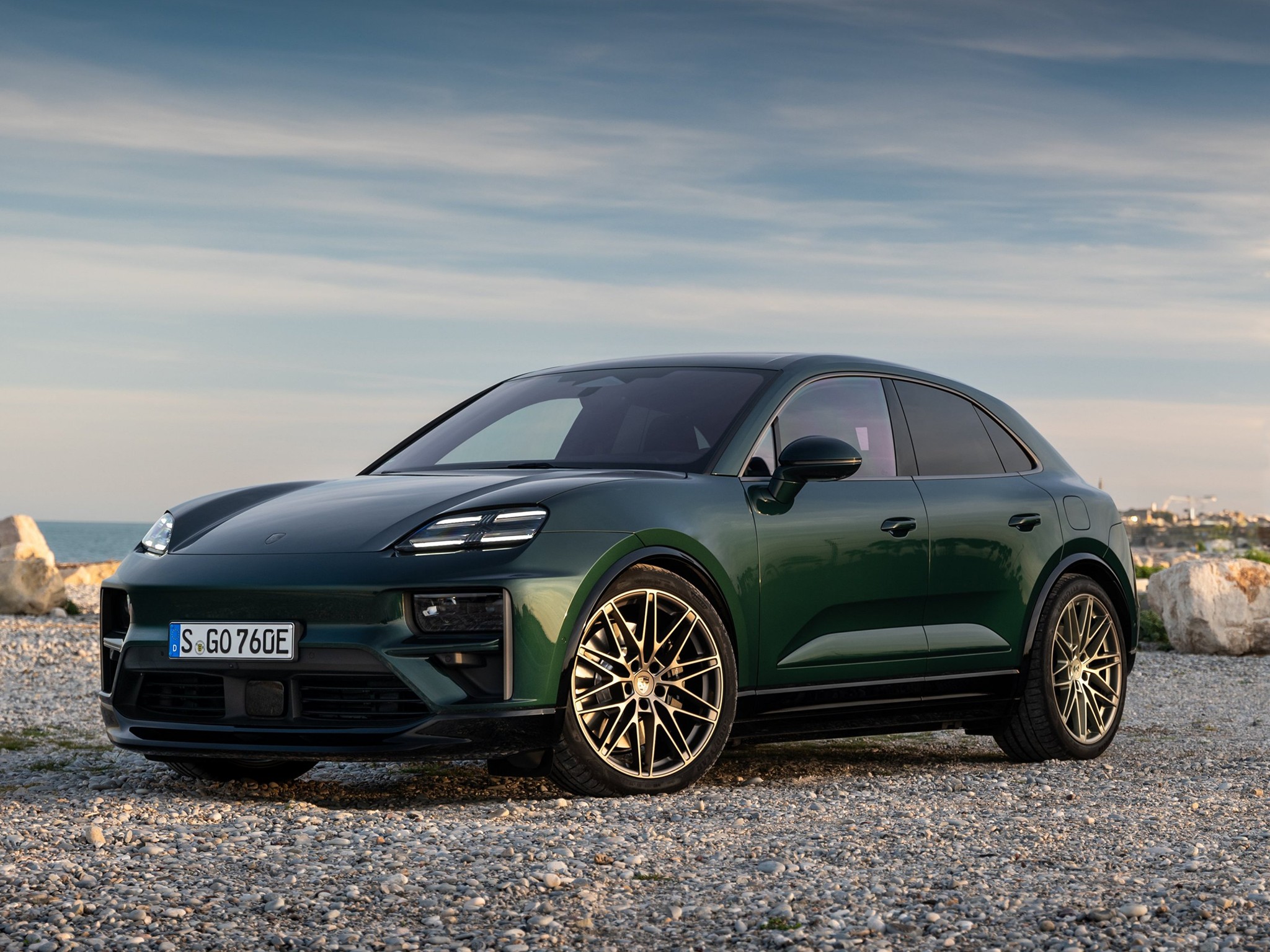 Porsche Macan Turbo
Porsche Macan Turbo
Image: The Porsche Macan Turbo, a sporty electric SUV with good range and Porsche driving dynamics.
(Porsche)
Independent Expert Rating: 8/10
Pros: Engaging driving experience, fast charging, excellent interior ergonomics.
Cons: Limited rear seat space, options can quickly inflate the price, Turbo model performance may be excessive for most.
Price Range: £67,200 to £95,000
Battery Capacity: 100 kWh
Maximum Official Range: 398 miles
Efficiency (Claimed): 2.9 to 3.6 miles per kWh
Peak Charging Rate: 270 kW
Porsche’s second electric car, the Macan, is a mid-size SUV that embodies the brand’s sporty character and quality. It features a large battery, rapid charging, and good energy efficiency, resulting in a claimed range of nearly 400 miles for the base single-motor model. While still enjoyable to drive with a 0-62 mph time of 5.7 seconds, it prioritizes range over outright Porsche performance compared to higher-spec variants.
Multiple Macan models are available, offering increased power, particularly in the Turbo trim, but with reduced range compared to the entry-level version.
Read our full Porsche Macan review
All Macan models feature a high-quality interior, excellent driving position, and well-designed controls. The infotainment system is user-friendly, and Porsche retains physical buttons for climate control adjustments, which are preferred by many drivers.
The Macan is a compelling option for those seeking a premium electric SUV that balances driving enjoyment, practicality, and long-range capability without being overly large or futuristic in its design.
Verdict: Long Range EVs Make Range Anxiety a Thing of the Past
The advancements in electric vehicle technology are rapidly changing perceptions around range limitations. It’s remarkable how quickly EVs have progressed from a range of around 200 miles to now offering over 400 and even 450 miles on a single charge. This level of range significantly reduces range anxiety and makes EVs viable for a wider range of driving needs, including long-distance travel.
While manufacturer-quoted ranges, based on the WLTP standard, are valuable for comparison, real-world range can vary depending on driving conditions, speed, and temperature. Colder weather, in particular, can negatively impact battery performance and range.
Currently, the Mercedes EQS boasts the longest official range at 481 miles. However, the Volkswagen ID.7, with a 436-mile range, earns a higher overall rating and represents excellent value at a lower price point. Ultimately, the “best” long-range EV depends on individual needs and priorities, but the models highlighted here demonstrate the impressive progress in electric vehicle range and capability.
Long-Range Electric Car FAQs
Can electric cars actually achieve their claimed range?
Think of an electric car’s claimed range like the MPG figure for a petrol or diesel car. These figures are derived from standardized tests designed to simulate real-world driving, but they can’t account for every possible scenario. They are most useful for comparing the relative range of different vehicles.
Real-world driving experiences often show that achieving or even exceeding the claimed efficiency is possible under moderate, steady-speed conditions. However, driving at higher speeds for extended periods will typically result in lower efficiency and reduced range. While many EVs can indeed travel 300-400 miles on a charge, consistently achieving the maximum claimed range at a constant 70 mph on long journeys may not always be possible.
Does cold weather affect electric car range?
Yes, cold temperatures can negatively impact electric car battery performance, similar to how cold affects the lithium-ion batteries in smartphones and laptops. To mitigate this, pre-heating your EV while it is still plugged in is highly recommended. This warms the battery and cabin using grid power, improving battery efficiency during initial driving and enhancing passenger comfort without draining the battery’s charge.
How can I maximize electric car range?
Several driving techniques can help extend your EV’s range. Reducing speed is a primary factor, as is selecting the car’s “Eco” mode, if available. Eco mode typically reduces accelerator sensitivity and may limit climate control power to conserve energy. Some EVs also offer driver-only climate control modes, which focus heating or cooling only on the driver’s area when driving solo, further improving efficiency.
Do larger wheels reduce electric car range?
Yes, larger wheels can slightly decrease maximum range, usually by a relatively small margin. Manufacturers may even publish different range figures for the same EV model based solely on wheel size variations.
